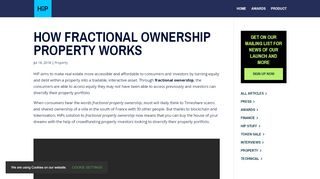
Equity Crowdfunding
Unfortunately for most people, the hurdles of purchasing investment real estate are too great and require significant capital, expertise and hard work. While large institutional investors have greatly benefited from this asset class in the past, enjoying equity like returns with less volatility than the stock market, this was not possible for the average investor until recently.
Innovative real estate investment companies are solving this issue by giving investors the opportunity to purchase “shares” in a property or real estate project, often achieved by aggregating investment capital through crowdfunding platforms. While equity raising in the private markets remains a difficult activity, crowdfunding has the potential to resolve the capital requirement problem for less financially capable buyers and at the same time widen the potential buyer base and pool of available funds. This has led to the rise of many real estate crowdfunding platforms, providing access to a range of real estate options which smaller investors and industry outsiders would previously not have been able to participate in.
How does Equity Real Estate Crowdfunding work?
– Most real estate crowdfunding deals involve equity investments (although debt is also available)
– Investment capital is aggregated, funding real property investments or projects
– Investment is made available through crowdfunding platforms specializing in real estate investments
– The investor becomes a shareholder in a specific property, their proportional ownership determined by the amount they have invested
– Returns are determined by the rental income the property generates (in proportion to the share an investor owns), less any service fees paid to the crowdfunding platform. Investors may also be paid out a share of any capital appreciation if the property is sold
Benefits:
– Access to large real estate investments and projects – smaller investors would previously not have had access to these due to the minimum investor size, lack of expertise or not having known an insider involved in the project(s)
– Access to deals and relationships only certain investors historically had
– Removes constraints such as geographical boundaries and minimum deal size
– Widens the potential buyer universe and pool of available funds
– Ability to choose between debt and equity investments
– Tax benefits – ability to deduct certain expenses associated with ownership, such as depreciation and the cost of repairs







